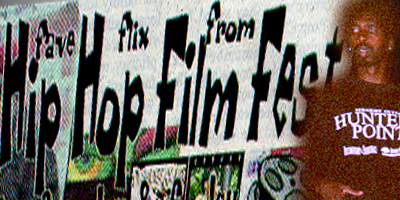|
by Connie Lu/PNN Youth in the Media Intern
Gusts of cold wind rush past my face with each car
passing under the overpass, as I prepare to cross the
street where the First Bay Area Hip Hop Film Festival at SomARTS
Cultural Center is being held to raise funds for the
The San Francisco Bay View Newspaper. The festival was organized by filmmaker and writers Kevin Epps (Straight Outta Hunters Point) and JR (The SF Bayview) in collaboration with many other independent media makers. There are
brightly painted murals filled with vibrant colors on
the outside of the building. The stage inside is
draped with heavy black curtains behind the large
screen in the middle. There is a long table to the
left with a royal purple tablecloth, prepared for the
panel discussion. Apart from the dim lighting are
frequent bright flashes of light from the clicking
cameras that are capturing the many events and faces
throughout the Film Festival. I am sitting in the
fourth row of orange chairs near the center aisle, as
the lights darken in commencement of the first film.
The first short film is called, "Estilo Hip Hop,"
directed by Vigilio Brava. It depicts the culture of
Hip Hop and its influence throughout various countries
of South America such as: Brazil, Chile, and
Argentina. Hip Hop provides an outlet of expression
through dance, vocalized lyrics, and the art of
graffiti to the people living in these countries who
are poor, but are driven to "maximize and optimize
every opportunity". Hip Hop is not only an interest
to them, but a is a true passion that strives and
feeds the creation of new elements.
The next film is "Voice of the Voiceless," directed
by Tania Cuevas-Martinez. It is a powerful
documentary film based upon the appeal process for
Mumia Abu-Jamal, a Pennsylvania journalist who exposed
police violence against minority communities. The
documentary showed violent footage by using effective
film techniques such as, split screens and overlapping
montages of these minority communities being bombed
and residents being beaten and sprayed with
high-pressure fire hoses in 1978. Mumia was then
wrongfully sentenced for shooting a police officer and
has been on death row since 1982. Various Hip Hop
artists and activists throughout the film express
their support to free Mumia, who believes "Revolution
is my religion".
After the film, there is a panel discussion with
representatives from several media sources. Kiilu
Nyasha of "SF Bay View/Black Panther Press" explains,
"The sponsors of the 'Bay View' are refusing to place
advertisements because of the political content of the
articles, which leads to the 'Bay View' not having
enough money". She goes on to express how "The system
doesn't tolerate 'real' free speech". Willie
Ratcliff, Publisher of the "SF Bay View" continues the
discussion and emphasizes, "The great need for young
people in the media because they are the future".
Despite the fact that each representative on the panel
was from a different media source, including KPFA, POOR Magazine/PNN, The Bay Guardian, and Greenscene, I could sense the
unity in coming together for the common cause of
supporting the "Bay View". I was also reminded of my
own role in the media through the words that I write,
which represent the skills I have gained from POOR
Magazine to help shape the media, instead of the media
showing what it wants to portray.
The last film of the night is "Nobody Know My Name,"
directed by Rachel Raimist, who depicts the influence
of Hip Hop on women as artists who are determined to
overcome the demeaning way of the media portraying
women as sex objects and nothing else. Asia One, a
B-girl in the film explains that she felt intimidated
to be the only woman among several men when she first
started breaking. But now, she takes pride in being a
woman in a field dominated by men and hopes to see
more women becoming involved in Hip Hop.
The female artist I was able to connect with the most
in the film was DJ Symphony because she expresses, "I
used to be really shy, but now I'm more comfortable in
front of a crowd of people". DJ Symphony also likens
the turntable to a musical instrument, which I
reminded me of having to perform at piano recitals and
feeling nervous with each note that sounded from my
shaking hands upon the ivory keys. She explains that
it is hard to get respect from the male DJ's because
there aren't that many girl DJ's. But her goal is to
be respected by the men, instead of others seeing her
as, "She's ok, for a girl".
After I left the Film Festival, I realized the vast
diversity of the people at this event that I had not
initially noticed and felt the willingness of the
community to share in the experience of uniting to
support the powerful the voice of the media through
the "Bay View".
| 



